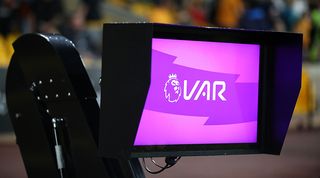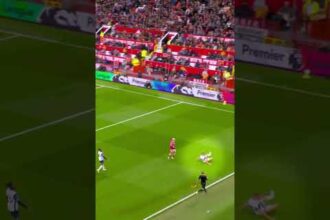Whatever your opinion on the video assistant referee (VAR) in football, you probably agree at least in principle that a competition’s sporting integrity should be sacred.
VAR in England is at the centre of an uneasy social contract between the Premier League, the FA, clubs and their supporters. The root of that contract is the notion of fairness and competitive equity.
The Premier League has announced that semi-automated offside technology, which “automates key elements of the offside decision-making process to support the video assistant referee”, will be introduced from Saturday, April 12.
Semi-automated offside technology is coming to the Premier League
The technology is already in use elsewhere in Europe and in the FA Cup. After “non-live testing” in the Premier League, it comes into operation in the top flight next weekend with seven match rounds left to play.
While semi-automated offside technology has been shown to be one of the more accurate and efficient weapons in the VAR arsenal – if nothing else, it provably speeds up one of the main areas of review – introducing it mid-season is far from ideal.
“It provides more efficient placement of the virtual offside line, using optical player tracking, and generates virtual graphics to ensure an enhanced in-stadium and broadcast experience for fans,” according to the Premier League’s announcement this week.
There’s no reason to believe it will directly cause any problems but goal-line technology wasn’t problematic before it failed in Aston Villa’s draw with Sheffield United in 2020.
The risk factor is greater than zero and that, with the season already in progress, is too much risk even if testing has been carried out and controversies in other leagues have been few and far between.
Consider the intangible implications, however, and you’ll see that the spirit of competition is silently damaged by the decision to deploy semi-automated technology one week when it wasn’t used in the week before.
Introducing it with 31 rounds of matches already played comes with the possibility of unnecessary question marks and an unwelcome precedent next time a mid-season change is proposed.
As a long-term opponent of VAR, I have serious concerns not only about the use of these technologies but the manner in which they’ve been implemented.
I’ve never been in favour of VAR but it’s important to recognise that it’s not going away and it does offer some positives.
Unfortunately, those positives have too often been dented by the timbre and timing of VAR’s unstoppable march into the English game.
Even as the Premier League has rolled on – these games and outcomes apparently so crucial that VAR was deemed necessary in the first place – tweaks have come and gone.
The Premier League and the PGMOL have reframed offside, handball, overturn thresholds, phases of play and even what constitutes a penalty, and all in a live competitive environment.
Semi-automated VAR is a step in the right direction but it should be a step taken in the summer, when a clean slate of 38 unplayed fixtures stretches out before us.
It might not sound like much in isolation but the freedom with which the authorities are happy to move the goalposts from one round of fixtures to the next should be a matter for greater scrutiny.
Given the Premier League’s claim that the technology “will not affect the accuracy of the decision-making” because “offside calls have been adjudged to be 100 per cent correct” this season, perhaps a more sceptical outlook wouldn’t be such a bad thing.













